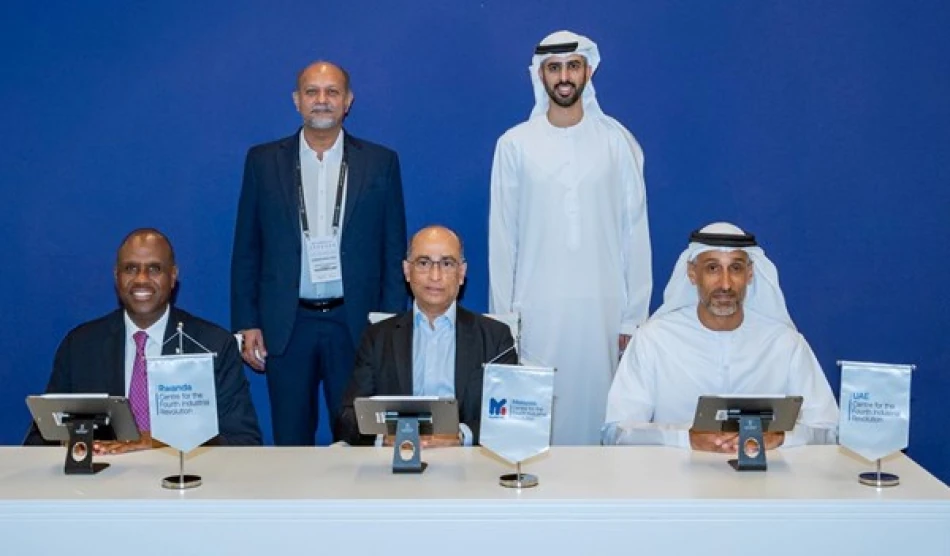
UAE, Malaysia, and Rwanda's Fourth Industrial Revolution Hubs Advance AI Governance
UAE, Malaysia, and Rwanda Form AI Ethics Alliance to Shape Global Technology Governance
Three nations spanning different continents have joined forces to establish ethical frameworks for artificial intelligence deployment, signaling a shift toward collaborative governance of emerging technologies. The partnership between UAE, Malaysia, and Rwanda's Fourth Industrial Revolution Centers aims to bridge global AI expertise gaps while ensuring responsible innovation serves communities worldwide.
Strategic Alliance Beyond Geographic Boundaries
The partnership agreement, signed in the presence of UAE Minister of State for AI and Digital Economy Omar bin Sultan Al Olama and Malaysia's Digitalization Minister Gobind Singh Deo, represents more than diplomatic cooperation. It establishes a concrete framework for talent exchange, joint initiatives, and coordinated governance structures for AI applications across diverse economic landscapes.
This collaboration builds on a previous agreement announced at the World Economic Forum's Davos 2024 between UAE and Rwanda centers, suggesting a deliberate strategy to create a multi-regional network rather than bilateral partnerships.
Beyond Traditional Tech Alliances
Unlike typical technology partnerships that focus primarily on trade or investment, this alliance prioritizes ethical AI deployment and knowledge transfer. The emphasis on responsible innovation reflects growing global concerns about AI's societal impact, particularly as nations race to implement AI across critical sectors like healthcare, finance, and governance.
Market and Investment Implications
For investors and technology companies, this alliance signals several important trends. First, it demonstrates that emerging markets are positioning themselves as AI governance leaders rather than merely technology adopters. Malaysia's participation is particularly significant, given its role as a Southeast Asian technology hub with strong ties to both Western and Chinese tech ecosystems.
The partnership also suggests that regulatory harmonization across different regions may accelerate, potentially creating more predictable environments for AI investments. Companies operating across these markets could benefit from aligned ethical standards and governance frameworks, reducing compliance complexity.
Competitive Positioning Against Tech Giants
This collaboration contrasts sharply with the AI strategies of major powers like the United States and China, which often emphasize technological supremacy over ethical considerations. By focusing on responsible AI deployment, these three nations are carving out a distinct position in the global AI landscape that could attract investment from companies seeking ethical technology partnerships.
Historical Context and Regional Significance
The UAE's leadership in this initiative reflects its broader strategy to become a global technology hub, building on successful initiatives like the Dubai Future Foundation and its 2019 Fourth Industrial Revolution Center. Rwanda's participation continues its remarkable transformation from a post-conflict nation to an African technology leader, while Malaysia leverages its position as a bridge between developed and developing economies.
This partnership also reflects a broader trend of South-South cooperation in technology governance, where developing nations collaborate directly rather than relying solely on frameworks established by traditional technology powers.
The Fellowship Program's Strategic Value
The AI fellowship program mentioned by Malaysian officials represents a practical mechanism for knowledge transfer that could yield significant returns. By facilitating expert exchanges, the program addresses a critical challenge facing many nations: the shortage of AI governance expertise. This approach could prove more effective than traditional consulting arrangements or technology transfers.
Challenges and Implementation Realities
Despite the ambitious goals, the partnership faces practical challenges. The three nations operate under different legal systems, have varying levels of technological infrastructure, and serve different economic priorities. Rwanda's focus on African AI development, Malaysia's ASEAN integration goals, and the UAE's global hub ambitions may create competing priorities.
However, these differences could also provide strength. Rwanda's experience with rapid technological leapfrogging, Malaysia's expertise in managing diverse stakeholder interests, and the UAE's international connectivity create complementary capabilities that could enhance the partnership's effectiveness.
Global AI Governance Implications
This alliance arrives at a critical moment in global AI governance discussions. As the European Union implements its AI Act and the United States develops its own regulatory framework, this partnership offers an alternative model that emphasizes collaborative governance over unilateral regulation.
The involvement of World Economic Forum's Fourth Industrial Revolution Centers network provides institutional credibility and global reach that individual national initiatives often lack. This structure could facilitate broader adoption of the ethical frameworks developed through this partnership.
For multinational corporations and investors, monitoring this alliance's development will be crucial. If successful, it could establish governance standards that influence AI deployment across multiple regions, potentially creating new compliance requirements and market opportunities for companies that align with these ethical frameworks.
Most Viewed News

 Layla Al Mansoori
Layla Al Mansoori






